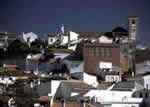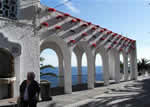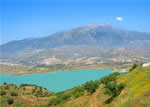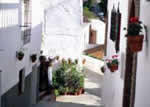It's hard to imagine in summer, isn't it? Day after day, the weathermen plant nice yellow circles on the map. Day after day, we fan ourselves, and gasp 'Qué calor,' which my phrase book translates charmingly as 'Phew, how hot it is!' You look at the vast empty dusty be-littered riverbeds, and big bridges, or at the huge grills over gorges to rubbish and tree branches, and wonder if they aren't a bit over the top. But then, if you have lived through September's thunderstorms or a really rainy October or March, you know different.
I used to live in Manchester where it barely rains there. Manchester's rain is grossly exaggerated. The year I moved in ('96, I think) there was a summer heat wave: the rare pubs that had beer gardens were heaving every hot evening; the grass turned yellow, then brown; the people turned pink than red, then red and white in patches. That was unusual of course: but still, it doesn't really rain in Manchester; not like it does here. It commonly specialises in clouds, overcast skies, in dusks as early as 3pm in winter, in skies so low they crush you, in year round drizzle. The best you get are gusty showers blowing in your face as you struggle to the tram. But good honest downpours are rare.
Here, on the other hand we have a sub-tropical climate. That doesn't just mean sun and heat, it means the water needed to fuel the extraordinary rich agriculture that includes avocadoes, sugar-cane, quince, medlars and bananas. To do that and keep what Torrox Pueblo boasts on a gigantic billboard is “The
Best Climate in Europe” the rains need to come in seriously heavy bursts. In Seville they have a saying, “The April rains are marvellous” meaning, I think, the way they transform the land into a cornucopia of growth. Traditionally Andalusia packs roughly the same rainfall as Manchester into about 3 months: when it does rain, it really spurts out of the taps.
If you live in the pueblos you see this up close. The very bones of these hill-towns shout about the water. They are so built-up, with no gardens to mop up rainfall that it's no wonder: streets become rivers, steps turn into weirs. Opening the window for my whining cat (who liked to get wet before she sat on our residencia applications) used to bring in a water-roar from the rapid, foot-wide stream tumbling down the centre of the street carrying bubbles and sweet-wrappers and dust and spouting over each tiny ledge. The noise was tremendous. With every roof terrace and balcony having spouts instead of gutters the place turns into a water park: your choice is wade mid-stream or be doused by the overhead jets.
It can seem like a long time if you get a good wet month. The first October we spent here seemed to rain from first to last. On the coast the towns really closed in on themselves. There's nothing as sad as stacked away tables and a grumpy barman peering out from a cupboard-sized bar into the rain. We got stuck waiting for a bus that had been delayed by floods and short-outs. A Spanish woman and her daughter invited us to share their umbrellas. Will, who does not like
umbrellas, said he was wet already (which I tried to translate) and walked off. After a bit the girl noticed that he was trying to shelter under a palm leaf, and protested. 'Well,' her mother said, 'I did ask, but this lady said he was wet already.' They looked at me, assessing my callous, hard-hearted nature. The rain came down in sheets but he stayed put. “He's a man,” I explained, “What can you do?” The Spanish woman pursed her lips, and marched towards the palm tree to show me…but fortunately just then the bus turned up.
That delay was inconsequential, or course, with a road or two temporarily closed. But there's often serious flooding: Velez-Málaga, Almuñeca, Rincon and other towns have suffered in all the expense, danger and disruption that implies, and there's been deaths. Knowing that sudden heavy local storms cause flash-floods should make prevention possible, but if this is delayed or inadequate – or the guess of where it'll happen is wrong, nature flips up a new disaster for every sandbag that goes down.
This sets up the most ridiculous situation. Andalusia is suffering a drought. In fact it's into its fourth year of serious drought. The reserves are holding only 34% of their capacity and large areas of the region, including the Axarquia have had barely half average rainfall this winter. It's got so bad that the COAG farmers union are calling on the Andalusian water agency to authorise emergency supplies for the Guadalhorce valley, to protect the regions hugely important citrus crop…again! They had emergency supplies authorised last year and in 2006. You have to wonder just how long the emergency supplies are going to last…
That's not the worst of it though. During the winter there were cloudbursts over Estepona and Marbella, which filled up the La Concepción reservoir: hurrah! It was known this sort of imbalance might happen, and it should be possible to redistribute the water – for example to the Guadalhorce valley. But the failure to complete pumping stations and get a new connection meant that it couldn't be done in time; La Concepción had to open its sluice gates and spew water – about 800 Olympic swimming pools' worth – into the sea. After three years of drought you would have thought the authorities would be a bit more up to speed. What a waste!
I hope the politicians get their act together. There's a lot of large-scale water-saving that can be done…like putting those pumping stations in place. And I wish the townhalls would subsidise the covering of farmers' depositos, water conduits and dikes, to reduce evaporation and help the townhouses getting fitted with gutters and waterbutts. In the meantime I only fill my kettle to the minimum for a cuppa; I don't run the tap when I'm cleaning my teeth; I mulch the plant pots and water them at night and haul shower water up from the bathroom to do it with. Most of the time, anyway. Every little helps.
After those years in Manchester, it's not rain I mind, but gloom; dim mornings and overcast afternoons. I don't want to live in the Sahara, though. As the bright, hot days of summer, with weeks of deep blue skies, dazzle and endless daylight, I think most will agree that if they'll only come in October or November or April and give the land the soaking it needs to maintain this wonderful land, the rains in this part of Spain really are marvellous. Though we might not say it when we've just walked under a waterspout.
Rose Jones



















